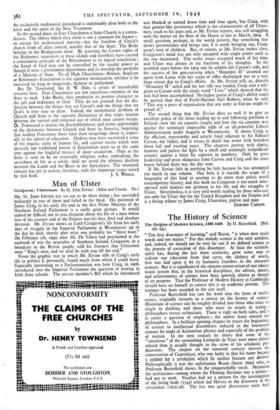Man of Ulster
Craigavon: Ulsterman. By St. John Ervine. (Allen and Unwin. 35s.)
MR. ST. JOHN ERVINE has set out to do three things ; has succeeded brilliantly in two of them and failed in the third. His portrayal of James Craig in his early life and as the first Prime Minister of the Northern Ireland Parliament is a really great picture. It would indeed be difficult not to wax eloquent about the life of a man whose love of his country and of the Empire was his first, final and absolute devotion. Mr. Ervine shows us Lord Craigavon's life from his early days of struggle in the Imperial Parliament at Westminster up to the day he died, shortly after what was probably his "finest hour." On February 5th, 1940, after Mr. De Valera had proclaimed at the outbreak of war the neutrality of Southern Ireland, Craigavon, in a btoadcast to the British people, told his listeners that Ulstermen were " King's men, and we shall be with you till the end."
From the graphic way in which Mr. Ervine tells of Craig's early life in politics I, personally, found much from which I could learn. Especially interesting to a Parliamentarian was how Craig, in 1906, introduced into the Imperial Parliament the question of heating in Irish State schools. The private member's Bill which he introduced
was blocked or turned down time and time again, but Craig, with that granite-like persistence which is the characteristic of all Ulster- men, stuck to his guns and, as Mr. Ervine reports, was still struggling with the matter on the floor of the House as late as March, 5914. A small question, perhaps, in the world pattern, but something that shows perseverance and brings out, if it needs bringing out, Craig- avon's love of children. But, of course, as Mr. Ervinc makes clear, Craigavon's mind was not only occupied with single points such as the one mentioned. The wider issues occupied much of his time, and Ulster was always in the forefront of his thoughts. In the troubled years before the 1914 war he seldom left Carson's side, and the success of the gun-running when 'Mountjoy II' steamed out again from Larne with her cargo of rifles discharged was to a very large extent due to Craig's efforts. As Mr. Ervine tells us, directly Mountjoy II' sailed and the last rifle was landed, Craig sent a tele- gram to Carson with the single word "Lion " which showed that the task had been accomplished. No higher praise of Craig's ability could be quoted than that of Field-Marshal Earl Roberts when he said, "This was a piece of organisation that any army in Europe might be proud of."
The second thing that Mr. Ervine does so well is to give an excellent précis of the times leading up to and following partition in Ireland—how the six counties fought and how the six counties won against the seemingly impossible odds of an all-powerful Liberal Administration under Asquith at Westminster. It shows Craig as the efficient, trustworthy and utterly loyal adjutant to Sir Edward Carson, my father, and it traces in detail but never with boredom those full and exciting years. The chapters portray with clarity, humour and pathos the fight by a small and seemingly insignificant country against a force far superior in numbers. Only by great leadership and great eloquence from Carson and Craig and the stout hearts behind them was the day won.
If Mr. Ervine fails in anything he fails because he has attempted too much in one volume. One feels it is outside the scope of a biography of this kind to attempt to do more than précis world contemporary history, and this book on Craigavon is too much inter- spersed with matters not germane to his life and the struggles of Ulster. Nevertheless, it is very well worth reading for those who care not only for Ulster but for the United Kingdom and the Empire and is a fitting tribute to James Craig, Ulsterman, patriot and man. EDWARD CARSON.


































 Previous page
Previous page